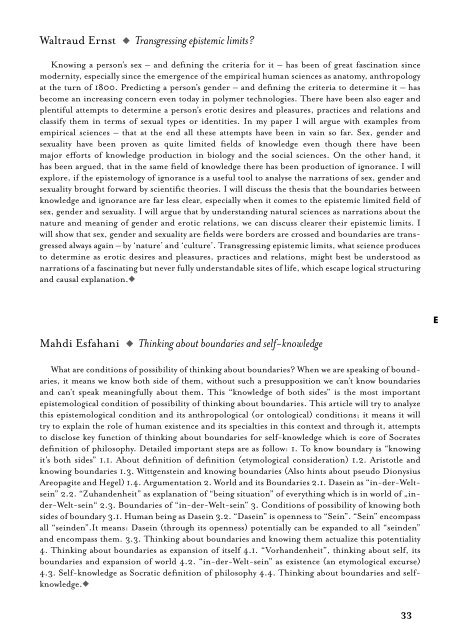Verlag.Buchhandel.Service. - Österreichische Gesellschaft für ...
Verlag.Buchhandel.Service. - Österreichische Gesellschaft für ...
Verlag.Buchhandel.Service. - Österreichische Gesellschaft für ...
Sie wollen auch ein ePaper? Erhöhen Sie die Reichweite Ihrer Titel.
YUMPU macht aus Druck-PDFs automatisch weboptimierte ePaper, die Google liebt.
Waltraud Ernst ◆ Transgressing epistemic limits?<br />
Knowing a person’s sex – and defining the criteria for it – has been of great fascination since<br />
modernity, especially since the emergence of the empirical human sciences as anatomy, anthropology<br />
at the turn of 1800. Predicting a person’s gender – and defining the criteria to determine it – has<br />
become an increasing concern even today in polymer technologies. There have been also eager and<br />
plentiful attempts to determine a person’s erotic desires and pleasures, practices and relations and<br />
classify them in terms of sexual types or identities. In my paper I will argue with examples from<br />
empirical sciences – that at the end all these attempts have been in vain so far. Sex, gender and<br />
sexuality have been proven as quite limited fields of knowledge even though there have been<br />
major efforts of knowledge production in biology and the social sciences. On the other hand, it<br />
has been argued, that in the same field of knowledge there has been production of ignorance. I will<br />
explore, if the epistemology of ignorance is a useful tool to analyse the narrations of sex, gender and<br />
sexuality brought forward by scientific theories. I will discuss the thesis that the boundaries between<br />
knowledge and ignorance are far less clear, especially when it comes to the epistemic limited field of<br />
sex, gender and sexuality. I will argue that by understanding natural sciences as narrations about the<br />
nature and meaning of gender and erotic relations, we can discuss clearer their epistemic limits. I<br />
will show that sex, gender and sexuality are fields were borders are crossed and boundaries are transgressed<br />
always again – by ‘nature’ and ‘culture’. Transgressing epistemic limits, what science produces<br />
to determine as erotic desires and pleasures, practices and relations, might best be understood as<br />
narrations of a fascinating but never fully understandable sites of life, which escape logical structuring<br />
and causal explanation.◆<br />
Mahdi Esfahani ◆ Thinking about boundaries and self-knowledge<br />
What are conditions of possibility of thinking about boundaries? When we are speaking of boundaries,<br />
it means we know both side of them, without such a presupposition we can’t know boundaries<br />
and can’t speak meaningfully about them. This “knowledge of both sides” is the most important<br />
epistemological condition of possibility of thinking about boundaries. This article will try to analyze<br />
this epistemological condition and its anthropological (or ontological) conditions; it means it will<br />
try to explain the role of human existence and its specialties in this context and through it, attempts<br />
to disclose key function of thinking about boundaries for self-knowledge which is core of Socrates<br />
definition of philosophy. Detailed important steps are as follow: 1. To know boundary is “knowing<br />
it’s both sides” 1.1. About definition of definition (etymological consideration) 1.2. Aristotle and<br />
knowing boundaries 1.3. Wittgenstein and knowing boundaries (Also hints about pseudo Dionysius<br />
Areopagite and Hegel) 1.4. Argumentation 2. World and its Boundaries 2.1. Dasein as “in-der-Weltsein”<br />
2.2. “Zuhandenheit” as explanation of “being situation” of everything which is in world of „inder-Welt-sein“<br />
2.3. Boundaries of “in-der-Welt-sein” 3. Conditions of possibility of knowing both<br />
sides of boundary 3.1. Human being as Dasein 3.2. “Dasein” is openness to “Sein”. “Sein” encompass<br />
all “seinden”.It means: Dasein (through its openness) potentially can be expanded to all “seinden”<br />
and encompass them. 3.3. Thinking about boundaries and knowing them actualize this potentiality<br />
4. Thinking about boundaries as expansion of itself 4.1. “Vorhandenheit”, thinking about self, its<br />
boundaries and expansion of world 4.2. “in-der-Welt-sein” as existence (an etymological excurse)<br />
4.3. Self-knowledge as Socratic definition of philosophy 4.4. Thinking about boundaries and selfknowledge.◆<br />
33<br />
E


